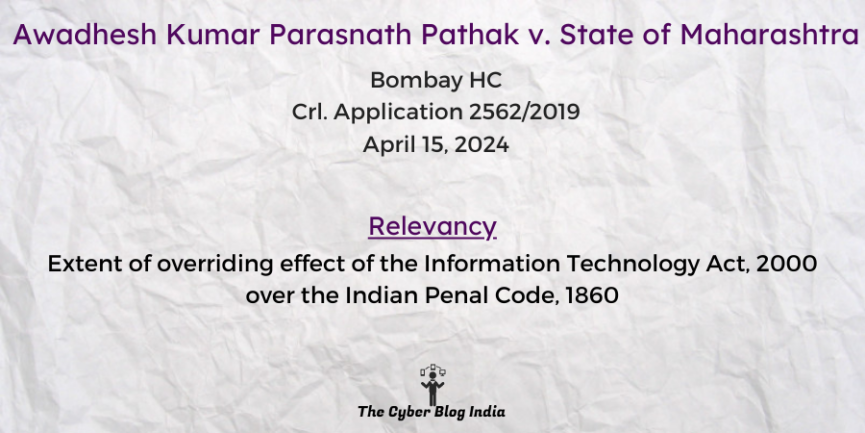Awadhesh Kumar Parasnath Pathak v. State of Maharashtra

Awadhesh Kumar Parasnath Pathak v. State of Maharashtra
In the High Court of Bombay
Crl. Application 2562/2019
Before Justice Mangesh S. Patil, Justice R.G. Avachat and Justice Shailesh P. Brahme
Decided on April 15, 2024
Relevancy of the case: Extent of overriding effect of the Information Technology Act, 2000 over the Indian Penal Code, 1860
Statutes and Provisions Involved
- The Information Technology Act, 2000 (Section 43, 66, 72) (“IT Act”)
- The Indian Penal Code, 1860 (Section 405, 406, 408, 409, 415, 420, 379) (“IPC”)
Relevant Facts of the Case
- Two division benches of the High Court have given conflicting judgements on whether special law prevails over the general law.
- In Gagan Harsh Sharma v. State of Maharashtra (2019 Cri LJ 1398), the court ruled that even a dishonest and fraudulent act falls within the scope of Section 66 of the Information Technology Act, 2000.
- According to Section 81 of the IT Act, it will have an overriding effect over the provisions of the IPC.
- In an order, the Aurangabad bench of the High Court in Awadesh Kumar Parasnath Pathak v. State of Maharashtra (Criminal Application 2562/2019) did not concur with this opinion. The court stated that the offences under the IT Act differ from those under the IPC.
- Hence, in the purview of this contradiction, a three-judge bench heard this matter on reference.
Prominent Arguments by the Advocates
- The applicant’s counsel argued that:
- The IPC provisions do not apply when the IT Act is applicable. The counsel relied on the Supreme Court’s decision in Sharat Babu Digumarti v. Govt. of NCT of Delhi. Further, Section 43 of the IT Act covers unauthorised access or securing access without permission.
- When the same act is done with a dishonest and fraudulent intention, Section 66 is applicable. Sections 66 and 72 of the IT Act subsume the ingredients of offences given under Sections 420, 208, 379 and 406, 408, 409 of the IPC, respectively.
- Hence, prosecuting individuals under both would contravene the legal protection against double jeopardy.
- The Public Prosecutor submitted that Section 43 of the IT Act does not include ‘inducement to defraud’ or an act done by another person, which is covered under Sections 415, 417, 420 of the IPC. Similarly, Section 72 of the IT Act does not cover instances where a breach of trust is done for personal use, as in Section 403 of IPC. Hence, such an application of provisions does not attract double jeopardy.
Opinion of the Bench
- Section 43 of the IT Act does not cover cases involving inducement. Further, Section 66 of the IT Act does not cover the ingredient of deceit, as given under Section 415 of the IPC.
- Section 72 of the IT Act does not cover instances where the breach of trust is for personal use. Hence, an investigation under Section 403 of the IPC will not constitute double jeopardy.
- Section 72 of the IT Act does not envisage common intention, per Section 34 of the IPC.
- To exclude a general provision, the ingredients of the offence under the special statute and IPC must be the same.
Final Decision
- The bench answered all the questions referred to in negative.
